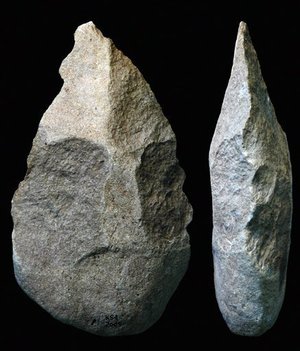Researchers discover oldest remains of advanced tools
 A team of researchers have discovered the oldest remains of advanced stone tools ever to have been found, at a site in Kenya.
A team of researchers have discovered the oldest remains of advanced stone tools ever to have been found, at a site in Kenya.
Archaeologists dug out some picks, flakes and hand axes while excavating mudstone banks on the shores of Lake Turkana in north-west Kenya. The stone tools, designed for crushing, cutting and scraping allowed early humans to butcher animal and use meat.
The largest of the tolls measure 20cm and has been chipped into shape on two sides, displaying more advanced stone tool making techniques. These advanced techniques were most probably developed by Homo erectus.
Researchers believe that the tools are about 1.76m years old, older than the earlier discovered tools, that were estimated to be around 1.4m years old and came from a haul in Konso, Ethiopia. Other tools found in India date back between 1m and 1.5m years old.
The stone tools from Kenya belong to the second generation of toolmaking known as Acheulian tools. Most Acheulian stone tools have been recovered from sites alongside fossilised bones of Homo erectus, which led to the belief that the techniques for making these type of tools were developed by the species.
Dennis Kent, a geologist involved in the study at Rutgers University in New Jersey and Columbia University's Lamont-Doherty Earth Observatory in New York said that the Acheulian tools were a giant technological leap